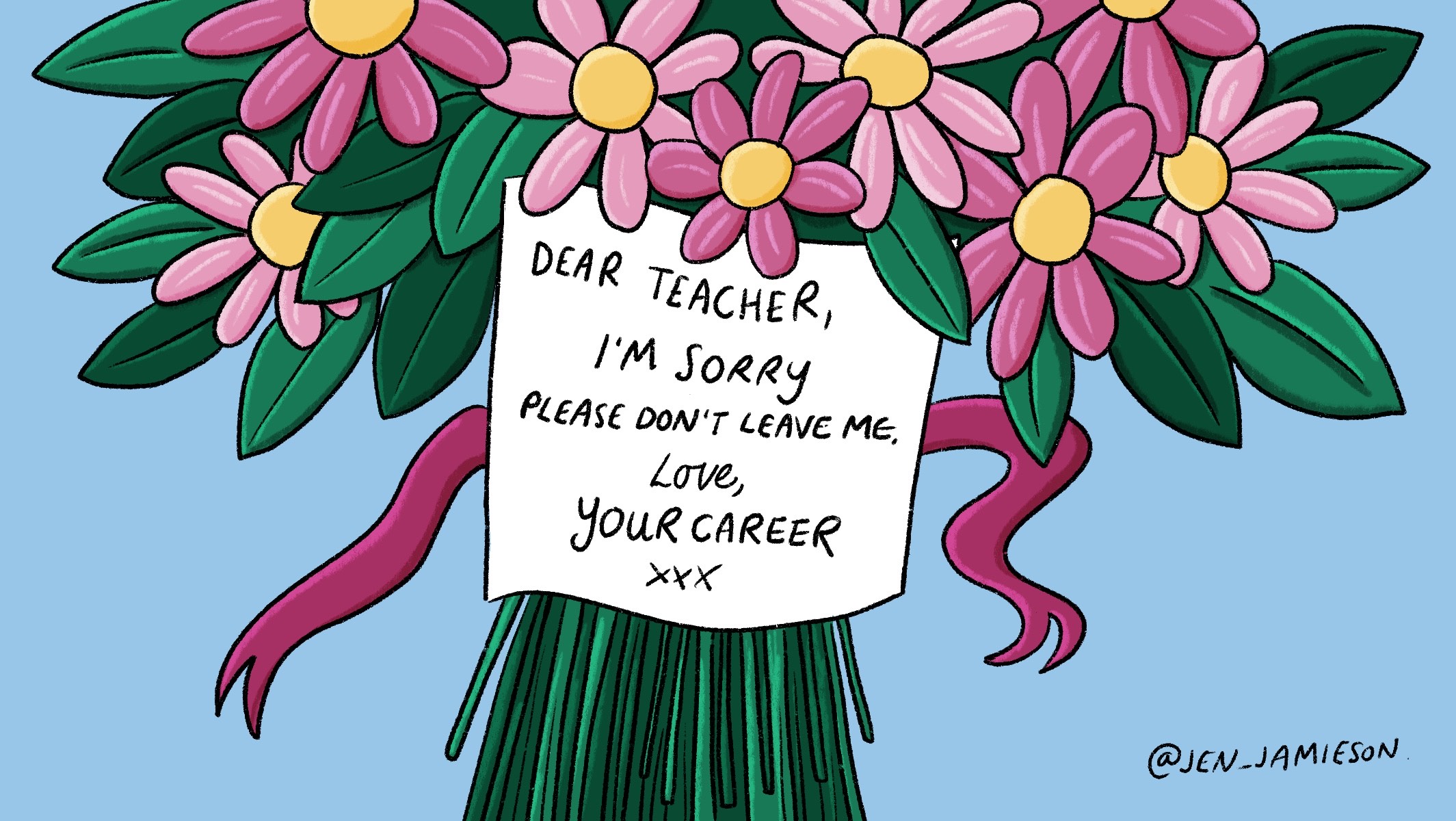Dear We Are Teachers,
I loved my first three years of teaching (2016-2019). It was hard being new, but I felt like I was doing a good job, that I had parents’ trust, and that I had good relationships with my students. Since the pandemic, I’ve felt ineffective, like I’m “the enemy,” and that my students are totally checked out. When I think about throwing in the towel, though, I think back to how much I loved those first three years. Is there any way to rekindle the love I had for this job?
—All Out of Love
Dear A.O.O.L.,
The past several years have been hard on teachers across the board. Every grade, every age, every subject. Full stop. So first, know that you’re not alone. Even teachers with 20+ years of experience are reporting feeling this way.
To me, it’s a great sign that you loved your first three years. For a lot of teachers—myself included—those were some of the toughest. Still, it’s hard to be in any job when you’re not at your best.
Start by pinpointing other professional changes that may be contributing to teaching being harder. Did you lose a planning period? Get an additional prep? Are you a supervising teacher or mentor? Did you lose a teacher bestie or gain a bummer team member? When a whole situation feels overwhelming, it’s good to pinpoint the areas you (or your principal) have control over.
Also, think back to your first three years about your happiest professional moments. A successful class project? An amazing field trip or class experience? A certain routine that brought you or students joy? An incredibly cool cross-curricular unit? See if you can re-create or build off those experiences to create new ones.
Then think of small ways to build positivity into your day. For example:
- These printables for the coolest tear-off posters or positive Post-Its
- Build positive school culture with a school-wide read-aloud
- Consider a fun new routine like attendance questions, desk pets, or silent ball
- Big projects with big payoff: a school garden, NaNoWriMo, partnering with senior citizens, or other service projects
And finally, understand that there are ebbs and flows in any career. You certainly don’t have to stick it out, but it sounds like teaching was really meaningful to you. See how this year goes. The teachers I know are saying—hesitantly, and while knocking on wood—that so far it’s been smoother sailing. Might be worth staying on board.
Dear We Are Teachers,
I have a sixth grader who is very sweet but really struggles with talking too much. Not to his peers—to me! He loves to talk to me during downtime and recess, but even the most cut-and-dried anecdote takes ages. Simple “yes/no” questions in class will sometimes result in a minutes-long response. I can tell his classmates are frustrated, but the student doesn’t seem to notice. I’ve started interrupting him so we don’t lose instructional time, but he seems hurt each time, which makes me think he hasn’t gotten the social cue. How do I curb this sweet-but-disruptive behavior?
—please Say Less
Dear P.S.L.,
I saw this student personality trait pop up in several schools. Each time it was in a very specific family circumstance: a miracle child that took years and often grueling fertility battles to conceive. Once I realized this pattern, it made sense to me that parents of miracle children would hang on to every word, soak in every story, and welcome every interruption—no matter how long. Knowing that made it easier for me to be compassionate.
That said, I don’t know for certain this is the case with your student. But I think it’s important to consider that, for whatever reason (maybe he’s just a chatty fella!), this is a behavior that is the norm for him. Be careful to keep your redirection as “we have different expectations at home versus at school” and not “this is a bad behavior we need to nip, like, yesterday.”
First, ask your student for some examples of procedures we do differently at home than at school, e.g., eating a meal, asking a question, going from place to place. Afterward, ask your student why we have different rules and procedures. Your student will probably arrive at efficiency, safety, fairness, and things like that.
Then say, “This is the same reason that we have different expectations around talking at school. I’m not just talking about you—I do, too! When I’m at home with my family, I like to tell them just about everything. But would it be OK if I was on the phone with my family all day at school? Of course not! We wouldn’t get any learning done.
“I love having you in my class and hearing what you have to share with me. But at school, we have limited time together—and we both have jobs to do.
“I want you to work on something this week for me. See if you can watch how long other kids keep their responses or stories. Try to match that. If there’s ever anything you really want to add or tell me, write me a note and I’d be happy to read it. Next week, we’ll check in to see how you’re doing. Sound good?”
After a week, if he’s still struggling, reach out to the parent (keep the emphasis on the impact it’s having on learning and your concern for his social development). Set up time to practice appropriate responses. Create fun drills to practice school-appropriate speaking and listening. For example, summarize The Three Little Pigs in under a minute. Or respond with just “yes” or “no” to a huge list of fun questions. Respond to my story about what I did over the weekend with a question or comment instead of an immediate “Here’s what I did.”
Honestly, I’m realizing we should just go ahead and make social conversation a required subject in school. Right? Or at least a requirement to be on dating apps.
Dear We Are Teachers,
Each year, the fourth grade teachers hold an election for a class president. We tie it to our social studies unit on government and do significant prepping with the kids on a social-emotional level. After this year’s election, I got the following email from a parent the morning after the election:
“Dear ____,
[Student] came home devastated that she did not get class president. She’s been sobbing ALL. NIGHT. She worked really hard on her posters and speeches, and she is certain she got votes from at least 14 of her peers (all the girls, plus two boys she knows from church), which should have definitely given her a majority. Can you scan the votes or take a picture so we can see them?”
Uh … help.
—Not Certified in Election Fraud
Dear N.C.I.E.F.,
LOL.
Absolutely not, Donna.
The best thing to do is get your administrator’s guidance on this since it sounds like she’s metaphorically ready to burn the place down. Your principal will likely have specific guidelines on what to say and do. Plus, this needs to be on their radar as a parent with … interesting requests.
I think you owe her an acknowledgment of her daughter’s disappointment, a brief summary of the unit plan, the learning goals for students, and the social-emotional prep teachers do to keep things fair and kind.
I do not think you owe her receipts for a fourth grade presidential election.
I’m laughing again.
Don’t let this lady get you down. In the epic words of my former boss at our small town’s bakery: “You know, some people’s milk of kindness done turned to bonnyclabber.”
Looking for more articles like this? Be sure to subscribe to our newsletters!
Dear We Are Teachers,
I’m a new sixth grade teacher. I’m loving this year so far except for one thing: There’s a bully on my team. During our weekly planning meeting, any comment or suggestion I make is immediately dismissed with, “That will never work,” or “That’s not how we do things here,” often with a joke about how young or inexperienced or overoptimistic I am. Another teacher on my team agrees with me that she’s rude to me, but she’s afraid of her too! How do I stand up to her?
—SUFFERING FROM DOORMAT FATIGUE


